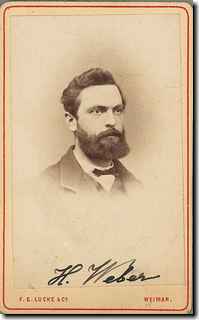- Heinrich Friedrich Weber
Infobox_Scientist
name = H.F. Weber
 |200px
|200px
image_width = 200px
caption = Heinrich Friedrich Weber
birth_date = 1843
birth_place =Magdala ,Germany
death_date = 1912
death_place =
residence =
nationality =
field =Physicist
work_institution = ETH Zurich
alma_mater =University of Jena
doctoral_advisor =Ernst Abbe
doctoral_students =
known_for = Work onspecific heat s
prizes =
religion =
footnotes =Heinrich Friedrich Weber (1843–1912) was a
physicist born in the town ofMagdala , nearWeimar . Around 1861 he entered theUniversity of Jena , whereErnst Abbe became the first of twophysicist s who decisively influenced his career (Weiss 1912, pp. 44-45). Weber soon discovered, however, that he lacked sufficient mathematical talent, and so he abandoned mathematics entirely (Weiss 1912, p. 44).Returning to physics, Weber found in Abbe a young and dynamic scientist, one who successfully focused much of his research efforts on re-thinking optical theory. Abbe not only instructed Weber in the lecture hall and laboratory, he also served as a role model for him in several other ways: through his emphasis on the importance of laboratory work in general and precision instrumentation in particular; through his view that science should be closely related to practical life; and through his embodiment of the idea that a single individual could accomplish much in life. This last point, according to
Pierre Weiss , Weber’s obituarist and successor at theEidgenössische Technische Hochschule , as the Zurich Polytechnic came to be called after 1911, was “the mainspring of his [Weber’s] life, the source of his most beautiful successes” (Weiss 1912, p. 44).Weber received his doctorate under Abbe in 1865 with a dissertation on the theory of
light diffraction . He spent the second half of the 1860s as a private tutor inPforzheim , publishing only one article during this period. Pforzheim was close to both theUniversity of Heidelberg , where Weber came into contact withGustav Kirchhoff , one of the leading theoretical physicists of the day, and to the Polytechnische Schule inKarlsruhe , where in 1870 he becameGustav Heinrich Wiedemann ’s assistant (Weiss 1912, p. 45). At the same time, Weber also managed to meet the professor of physiology at Heidelberg,Hermann von Helmholtz , perhaps through Kirchhoff or Wiedemann, since both of them were close friends of Helmholtz’s. When Helmholtz leftHeidelberg in 1871 to accept the call as professor of physics at theUniversity of Berlin , he took Weber along as his first assistant. Helmholtz now became the second formative, and decidedly primary, influence on Weber’s career.During his three years as Helmholtz’s assistant in Berlin (1871-1874), Weber helped Helmholtz set up and equip the Berlin laboratory and also helped him direct the student laboratories.
In 1872 and 1875, Weber published two noteworthy papers in the "
Annalen der Physik " on determining thespecific heat s ofcarbon ,boron , andsilicon at various temperatures (Weber 1872, 1875). Working in Helmholtz’s refurbished Berlin laboratory, Weber measured the specific heats of these three elements and showed them to be noticeably smaller at low temperatures than predicted by theDulong-Petit law ; moreover, he found that, with an increase in temperature, their specific heats increased extraordinarily rapidly. Only when he increased the temperature beyond 1,000 degreesCelsius did the specific heats again follow the predictions of Dulong and Petit. For nearly thirty years Weber’s empirical findings remained an anomaly until one of his students presented a new explanation (Weiss 1912, pp. 49-50; Pais 1982, pp. 391-392).Einstein and Weber
Weber was
Albert Einstein 's initial doctoral advisor. Following a bitter disagreement with Weber, Einstein switched toAlfred Kleiner as his advisor. Einstein also famously once commented that Weber's lectures were fifty years out of date and did not containMaxwell's equations .See also
*
Lommel–Weber function References
* Pierre Weiss "Prof. Dr. Heinrich Friedr. Weber. 1843–1912," "Schweizerische Naturforschende Gesellschaf. Verhandlungen," 95 pp. 44-53, (1912).
Wikimedia Foundation. 2010.
